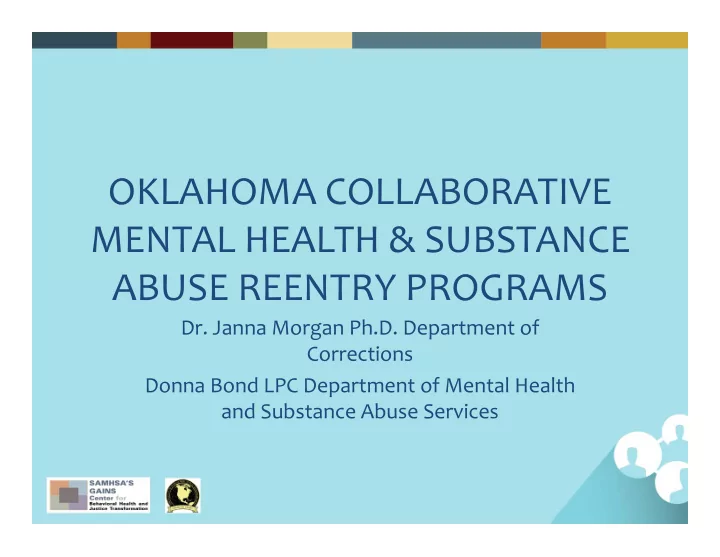

OKLAHOMA COLLABORATIVE MENTAL HEALTH & SUBSTANCE ABUSE REENTRY PROGRAMS Dr. Janna Morgan Ph.D. Department of Corrections Donna Bond LPC Department of Mental Health and Substance Abuse Services
HISTORY First Step 2004 In 2004, the Substance Abuse and Mental Health Services Administration (SAMHSA) contracted with Mathematica Policy Research (MPR) to work with key stakeholders in Oklahoma to design, implement and evaluate a model program to ensure that individuals with serious mental illness were enrolled in Medicaid upon discharge from state mental and correctional institutions (SAMHSA, 2010).
HISTORY Next Steps 2004 ‐ 2007 In 2004, (SAMHSA) contracted with Mathematica Policy Research The executive leadership of Oklahoma Department of Corrections ODOC, Oklahoma Department of Mental Health and Substance abuse Services, ODMHSAS, the Oklahoma Department of Human Services and the Oklahoma Health Care Authority (Oklahoma State Medicaid Agency) met to support the SAMHSA project. Representatives of these agencies developed a program that would enable discharging offenders with serious mental illnesses (SMI) and who are eligible for federal benefits, to obtain the benefits upon release from prison. An interagency workgroup served as the core group to design, develop and implement the project
HIGH COST OF RECIDIVISM
FUNDING & COST SAVINGS In 2007, ODMHSAS and ODOC implemented the collaborative Mental Health Reentry Program (MHRP). Although the initial start up funding for the program was allocated through legislative funding, the ODMHSAS has funded this innovated program for just over 1 million per year since 2007. Cost to incarcerated a seriously mentally ill (SMI) offender can be in excess of $27,000 annually versus $2,700 for MHRP. One significant savings research determined; $776,000 per year savings in reduction of inpatient hospitalization days for program participants versus comparison group at approximately $400 per day.
PROGRAM COMPONENTS Targets seriously mentally ill offenders discharging from ODOC Designated facilities with MHUs , both male and female Services begin inside prisons, preferably 12 months from release date, assessments & referrals made to contracted community teams from community mental health centers Community based teams consisting of Peer Recovery Support Specialist (PRSS) and Certified Case Manager (CCM) arrange and conduct date for first outreach visit
PRISON BASED INITATIVES ODMHSAS has 7 staff that are co ‐ trained and orientated to work inside prison facilities full time Identification of target population, assessment and referral process to community teams in correctional facilities by Integrated Services Discharge Managers Co ‐ occurring Therapists provide co ‐ occurring groups in designated facilities with offenders diagnosed with co ‐ occurring needs prior to release from prison
Oklahoma State Penitentiary
REENTRY INTENSIVE CARE COORDINATION TEAMS (RICCT) Four Teams in Oklahoma, two teams in Oklahoma County and 2 teams in Tulsa County (counties with highest number of convictions) Teams provide intensive, integrated case management, available 24/7, services begin immediately upon release for participants Each team has contract with budgets to include flex funds for basic living needs & housing assistance
STATE WIDE PROGRAM MEETINGS
PROGRAM PARTICIPANTS GUEST SPEAKERS
COMMUNITY BASED INITIATIVES RICCT services begin with outreach inside ODOC’s prison facilities, goal is monthly for 4 to 6 months min ODOC Officers transport offenders directly to the RICCT agencies day of release for majority of discharges ‐ Offenders leave prison with a minimum of 4 to 6 weeks of medication Same day intake with facility, transport to obtain food stamps, food, clothing, hygiene items, to housing location pre ‐ arranged with RICCT Services may be daily initially with team members taking to court clerks, probation offices, social security administration, department of transportation, and other community based needs—*SAFETY IS ALWAYS #1 PRIORITY
PRSS STRENGTHS WITH RICCT Peer Recovery Support Specialists (PRSS) positions are crucial with target population PRSS provides client advocacy & Community Recovery Support Services to include individual and family services. Many participants report the PRSS staff as leading contributor for maintaining program engagement
PRSS TRAINING & QUALIFICATIONS Training Requirements: Qualifications include: 40 hour face ‐ to ‐ face training Demonstrated recovery from High school diploma or college mental illness, substance abuse disorder or both transcript 18 years of age $25 non ‐ refundable application Willing to disclose recovery story free Be employed, or volunteer with a Obtain National Provider Identification Number behavioral health service Signed employment verification provider or advocacy group Agree to respect and observe the and Code of Ethics forms 12 Continuing Educations Units PRSS Code of Ethics Pass an examination testing obtained each year to maintain certification standards and competencies of peer role after 40 hour training
FUTURE IMPLICATIONS FOR PRSS IN CRIMINAL JUSTICE PROGRAMS Supplemental trainings and specialty tracks in development for individuals who have lived experience with Department of Corrections systems Additional 1 day training after completing the initial PRSS core training Credential will be designated as PRSS ‐ F Goal is to reduce recidivism by developing a PRSS workforce that has the knowledge and ability to better support people involved with the criminal justice system
FURTHER INFORMATION? Dr. Janna Morgan, Chief Mental Health Officer with the Oklahoma Department of Corrections janna.morgan@doc.state.ok.us 405 ‐ 962 ‐ 6138 Donna Bond, Manager of Correctional, Criminal Justice & Reentry Services with the Oklahoma Department of Mental Health and Substance Abuse Services dbond@odmhsas.org 918 ‐ 302 ‐ 4627
Recommend
More recommend